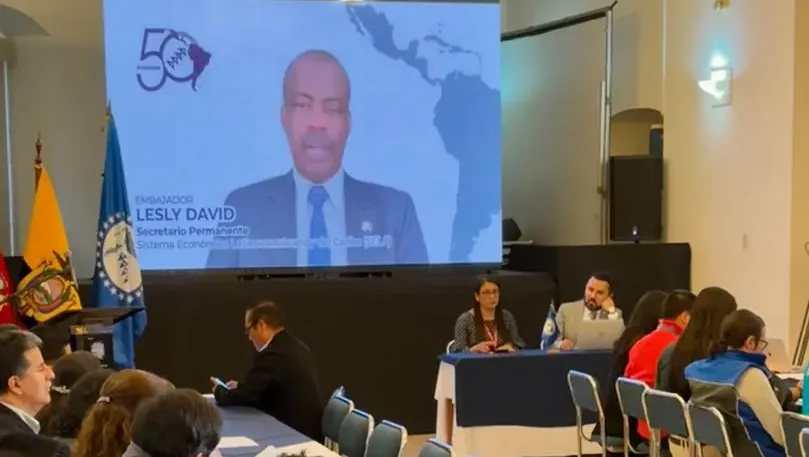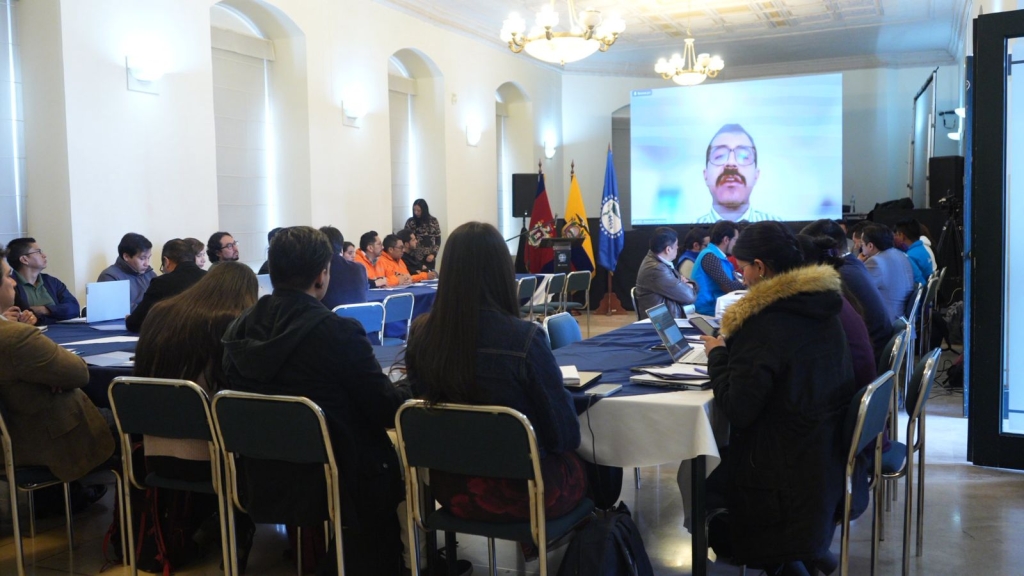
The Latin American and Caribbean Economic System (SELA) and the Inter-American Conference on Social Security (CISS) opened the Workshop on disaster risk management with a social protection approach, which is being held in person on 12 and 13 August in the city of Quito.
In his opening remarks, the Permanent Secretary of SELA, Ambassador Lesly David, recalled that this initiative “seeks to deepen the focus on social protection as a central component” of risk management.
“We must recognise that a strong and resilient community is one where no one is left behind,” Ambassador David said, adding that traditional management, focused on response and infrastructure, needs to be complemented by policies that protect people before, during and after a disaster.

The Ambassador highlighted the decision to prioritise the participation of local institutions, because “they are the first line of defence, the ones who know the daily realities and specific needs of their people,” and explained that the training is aimed at providing this first level with practical tools to identify populations at risk, design programmes that are sensitive to the disaster context, and promote sustained recovery.
In his speech, he detailed the training objectives of the meeting: to understand the interconnection between disasters and society in order to identify the roots of vulnerability; to develop practical skills and methodologies applicable to local contexts; to strengthen community resilience in order to shorten recovery times; to promote public policies that prevent disaster-induced poverty and foster sustainable development; and build a regional collaboration network that will endure beyond the training session.
“By incorporating social protection into risk management, you will become agents of change,” Ambassador David concluded, inviting those present to participate actively.
For his part, the Chief of Cabinet for the CISS, Emmanuel Ramírez, emphasised that “adequate living conditions must be guaranteed” in the midst of disaster emergencies.
“At the Inter-American Conference on Social Security, we are convinced that risk management cannot be considered in isolation; it requires a broad perspective that integrates social protection as a powerful tool for prevention, response, and recovery,” Ramírez said.

In addition, the Metropolitan Director of Risk Management at Municipality of Quito, Patricia Carrillo, highlighted the activity as a “space for meeting, learning and finding these very productive alliances” for risk management. “At the General Secretariat for Citizen Security and Risk Management, we reaffirm our commitment to work in a coordinated manner to build safer, more prepared and resilient communities,” she said.

The Workshop on disaster risk management with a social protection approach, held in collaboration with the Economic Commission for Latin America and the Caribbean (ECLAC) and the Network for Social Studies on Disaster Prevention in Latin America and the Caribbean (LA RED), brings together officials, technical staff and decision-makers involved in risk management systems, security and social protection, with the aim of strengthening capacities to coordinate integrated responses to disasters.
The event is structured into four thematic modules that include theoretical contents, case studies, regional best practices, and practical exercises, with the aim of facilitating learning that is contextualised in local realities. Among the topics covered are: fundamental concepts of Integrated Disaster Risk Management (IDRM), risk analysis, design of intersectoral public policies, social impact assessment, recovery strategies, and public-private partnership (PPP) models.
This workshop is part of a series of meetings held between SELA and CISS in countries such as Honduras, Belize and the Dominican Republic, and has established itself as a regional forum for training, dialogue and the development of innovative solutions to the challenges of climate change and the social effects of disasters.
Disaster Risk Management is a topic of SELA’s Work Programme for 2022-2026, which aims to establish regional structures that contribute to reducing vulnerabilities, responding effectively to emergency situations and caring for the populations most vulnerable to extreme natural phenomena through social protection systems.
